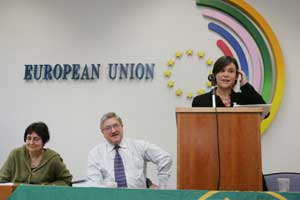9 December 2004 Edition
Home Rule or the Republic?
BY Justin Moran

Carol Fox and Roger Cole of PANA with Mary Lou McDonald MEP
The offices of the European Parliament on Molesworth Street in Dublin's city centre are rarely seen as a centre for Euro-critical thought, but last Saturday this was the venue for a half-day seminar organised by the Peace and Neutrality Alliance (PANA) on the proposed EU Constitution.
Almost 100 activists from a variety of left-wing, progressive political parties and organisations took part in a series of discussions following contributions from some of the major Euro-critical groups in the country.
Carol Fox of PANA opened the conference, outlining the organisation's position on the Constitution and providing a detailed analysis of the dangers it holds for the fast eroding Irish tradition of military neutrality.
She pointed to new developments such as an EU Minister and Department of Foreign Affairs, expansion of the 'Petersberg Tasks' to include combating 'terrorism' and pre-emptive military action and new mutual defence clauses. Fox's remarks, available on the PANA website, were as thorough an analysis of the neutrality implications in the Constitution as has been delivered.
She concluded by rhetorically asking if we can trust the assurances on neutrality from a "Taoiseach who defines traditional neutrality as allowing 300,000+ US soldiers to transit through Shannon on the way to an illegal war in Iraq."
Sinn Féin MEP Mary Lou McDonald spoke next and made it clear what is at stake. "There is no doubt that this Constitution is the single biggest decision the Irish people will have to take with regard to our relationship to the EU," she said "There will be those who will try to minimise the implications and importance of this decision, there will be those why try to dumb down or limit the debate.
"Those of us who are seriously concerned about issues of neutrality, democracy, sovereignty and defence of public services know different and it is our responsibility to lead the campaign for an informed and serious debate and an outcome that respects the Irish people and the Irish nation."
Dealing with the counter argument put forward by elements of the Labour Party that a strong Europe was needed to balance an increasingly powerful and arrogant United States, McDonald declared simply that: "I don't like empires. Whether they are British, American or European. And I think it is an extremely arrogant claim to make that Europeans are somehow better than Americans and more benevolent imperialists. There is a wealth of historical evidence from Europe's colonial past to prove otherwise."
There were a number of other contributions, including a detailed analysis of the neo-liberal consequences of ratification of the Constitution from Brendan Young of Democratic Accountability for Public Services in Europe (DAPSE). Young pointed out that a large number of progressive, left of centre voters in Ireland were backing an EU integration process that encouraged privatisation, deregulation and unceasing assaults on public sector workers.
There was a positive and optimistic aspect to the contributions from the floor, with many delegates expressing a desire to get the campaign off the ground as quickly as possible and pool resources to ensure the best possible campaign. Roger Cole, Chairperson of PANA, pointed out that the pro-Nice parties outspent the opposition by five to one in the last campaign on Europe.
While no date has yet been set for the referendum, it is clear that the Government is already at an advanced stage of planning for the forthcoming vote. The EU Constitution will be a central issue for republicans and the broad left in Ireland over the next two years as the Irish people, almost a hundred years since the foundation of Sinn Féin, are obliged once again to choose between Home Rule and the Republic.
